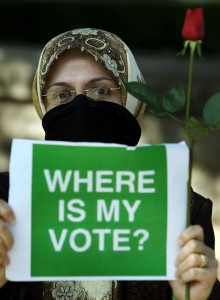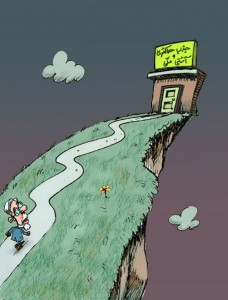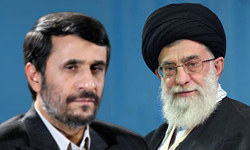The Latest from Iran (30 August): Khamenei Slaps Down Ahmadinejad
 Monday, August 30, 2010 at 18:43
Monday, August 30, 2010 at 18:43  2010 GMT: Khatami's Qods Day Message for Iran. The Facebook page supporting Mir Hossein Mousavi has posted the English text of Mohammad Khatami's message for Qods Day. Inevitably, much of the statement was about Palestine, but Khatami did have a sharp passage directed at Tehran rather than Jerusalem:
2010 GMT: Khatami's Qods Day Message for Iran. The Facebook page supporting Mir Hossein Mousavi has posted the English text of Mohammad Khatami's message for Qods Day. Inevitably, much of the statement was about Palestine, but Khatami did have a sharp passage directed at Tehran rather than Jerusalem:We cannot suffer from colonial dependence in one place and say that we should fight that and be ignorant toward that in another place; or vice versa we say that others should be free and have sovereignty to chose their own fate and should ne not be under tyranny, colonialism and dictatorship but if such issues happen to us we be ignorant toward them! No! human problems are linked together.
The roots of many of these issues are in the teachings and history of Islam as well. One of these issues is what gives legitimacy to a system, a society and a government? What is the basis for legitimacy? There is a common principle that humanity have reached and we as Muslims also have accepted that and that is the fact that people's votes and satisfaction are the foundations to establish a legitimate system.
If people's consent does not exist, no government can be imposed on the people; and even if it is imposed it will not be legitimate. Of course according to our views based on Islam and Shia teachings a government should have some principles and meet some conditions and if it does not then it will not be legitimate. Government should meet some conditions and the rulers also should meet some conditions.
According to teachings of Imam Ali (Shia's first Imam), he had stated that if people's votes and presence did not exist, he would have never accepted to govern. It means that even in case of Imam Ali's government if people did not voted of it, it would have not been imposed on the people because if such thing would have happened it would have been wrong.
When we say democracy this is it: democracy in line with religion....
NEW Iran: The Regime Feels the Pressure on Stoning
NEW Iran Special: Political Prisoners, Election Fraud, & The Regime’s Backfiring Propaganda
NEW Iran Breaking: Karroubi on Election Fraud; House Surrounded by Pro-Regime Crowd
Iran: Ahmadinejad Attacks Rafsanjani & “Corrupt” Foes; “Overthrowers Have Not Been Punished Yet” (Kamdar)
UPDATED Iran: Tehran Declares Readiness for Nuclear Talks?
Iran: An Ayatollah’s “Larijani is a Jew” Declaration
The Latest from Iran (29 August): The “Hidden Imam” Circle
1800 GMT: Families Protected. The Los Angeles Times, via Iran Labor News Agency, reports that the Parliament has referred controversial articles of the Family Protection Bill back to committee for further study.
Speaker of Parliament Ali Larijani said, "According to the notification of the lawmakers and in consultation with the judiciary branch, seemingly the articles 22, 23 and 24 contain some Islamic shortcomings. Therefore, they will be returned to legal and judiciary commission to be corrected."
Parliament had already voted down a provision that would have allowed registration of "temporary marriages". The bill also would make ease the financial and legal regulations on polygamy for men.
1755 GMT: Supreme Leader Slaps Down the President. And the day gets even more interesting....
The website of Ayatollah Khamenei's office reports that, in a meeting with the President and the Cabinet, the Supreme Leader said they must "avoid parallel work in areas including foreign policy". That is an in-your-face message to Ahmadinejad that Khamenei is not happy with the President's appointment of four special representatives for international matters.
1740 GMT: Karroubi Watch --- Urgent. We've added to our feature on Mehdi Karroubi's latest statement, condeming election fraud and repression, with the disturbing news that his house is being declared the meeting place for plotters of sedition and that it has been surrounded by 50 "plainclothes forces".
1730 GMT: It's a bad propaganda week so far for the Iranian Government. We had already posted a feature on its bungled publicity over detained reformist Mostafa Tajzadeh; now we write about Tehran's nervousness that its image is being damaged by the case of Sakineh Mohammadi Ashtiani, condemned to death for adultery.
1400 GMT: Electricity Squeeze. DayPress claims that residents in Ahwaz in southern Iran have protested sharp rises in electricity bills, amidst 50-degree Celsius (122-degree Fahrenheit) heat.
1350 GMT: Rafsanjani Watch. Former President Hashemi Rafsanjani is maintaining a tough line on international matters: “The United States propped up Islamic extremism and created the extremist groups to impede the Islamic Revolution, but ... now they are plagued with [the acts of] their own puppets....The ill-informed and prejudiced [officials] in the West overtly express their animosity towards the liberating teachings of Islam and the Quran under the pretext of [opposing] the blind al-Qaeda terrorism and Islamic extremism.”
1344 GMT: Economy Watch. Despite sanctions and economic difficulties, the Tehran Stock Exchange continues to rise because of trading by state-run firms, increased liquidity, and the government's push for privatisation. The Exchange has hit a record high, rose nearly 4 percent on Sunday and Monday, adding a nominal $10 billion to its value.
1340 GMT: Qods Day Alert. Five days before Iranians are asked to recognise the situation of Palestine, former President Mohammad Khatami has declared that Qods Day "is a symbolic day against oppressors".
1330 GMT: Interview of the Day. It has to be Foreign Minister Manouchehr Mottaki's exchange with the German magazine Der Spiegel, "The West Lacks Political Maturity". This is the mature start to the discussion:
SPIEGEL: Mr. Foreign Minister, you are the senior diplomat of the Islamic Republic of Iran. You represent a nation that prides itself on a cultural history stretching back more than 2,500 years. Don't you find it shameful that people are stoned to death in your country?
Manouchehr Mottaki: You come from a country that murdered millions of people during a tyrannical war, and you want to talk to me about human rights? OK, we can certainly discuss the laws in various countries and naturally we can, in a friendly atmosphere, debate the different legal principles.
The interview features Mottaki's claims, "No one is executed in Iran for political reasons. You have no evidence to prove the opposite," and "Confessions were made in an open atmosphere, in the presence of media representatives. They were also repeated in front of other witnesses." However, this is the maturity showpiece from the Foreign Minister:
This election was a triumph. We had the highest turnout for a presidential election since the 1979 revolution. Of 40 million voters, a turnout of 85 percent, 25 million voted for Mr. Ahmadinejad. But as was already the case during Mr. Ahmadinejad's first election in 2005, the West apparently expected a different election result. We think the Western countries lack political maturity.
Manipulation is an issue in elections everywhere. Just think of the differences of opinion that elections have triggered in the United States, where a court had to step in to end a dispute over the validity of ballots. The accusations were also investigated in our country, at the urging of the opposition and our leadership. The votes were recounted. Since then, the result has been legally binding.
1210 GMT: The President's Right-Hand Man. Looks like the Ahmadinejad office is ready for a fight with conservative MP Elyas Naderan over the claim that Chief of Staff Esfandiar Rahim-Mashai met the former US ambassador in Israel: "We reject the baseless claim made by an Iranian parliamentarian...and we secure our right to pursue the issue legally."
Meanwhile, Foreign Minister Manouchehr Mottaki, trying to defend the President's appointment of Rahim-Mashai and three others as special representatives for foreign policy, has said that Naderan's remarks in Parliament had "nothing to do" with the questions he had tabled over the appointments. Mottaki said he might have to give Naderan a "yellow card" for his behaviour.
1000 GMT: Political Prisoner Watch.Ghorban Behzadian-Nejad, the manager of Mir Hossein Mousavi's campaign, is free on bail after 9 months in detention.
Women's rights activist Mahboubeh Karami is reportedly in hospital after her release on $50,000 bail. Karami has been sentenced to four years in prison.
0855 GMT: We have now posted our special feature, "Political Prisoners, Election Fraud, & The Regime’s Backfiring Propaganda."
0700 GMT: Sanctions Watch. William Yong of The New York Times follows up on the development, which we noted last week, that Iran is withdrawing its assets from European banks to prevent them being frozen.
0645 GMT: Shutting Down the Lawyers. Fereshteh Ghazi reports on another instance of harassment and intimidation of Iran's defence attorneys. Nasrin Sotudeh's office and home have been searched, and the lawyer has been accused of propaganda against the regime.
0640 GMT: Discussing, Organising. Activists have announced a conference from 1 to 3 October at the Free University in Berlin to discussion the formation of "an independent, widespread organization of Iranian youth and students abroad".
0636 GMT: Political Prisoner Watch --- The Latest Names. An activist, drawing from RAHANA, has published an English-language list of 574 known political prisoners currently in detention.
0633 GMT: Political Defiance. The reformist Islamic Iran Participation Front, banned by the Government, continues to defy its "non-existence". Rah-e-Sabz has photos of an Iftar, the meal breaking the daily fast during Ramadan, of IIPF members.
0630 GMT: Execution Protests. Mission Free Iran claims that Rasht, a city in northwest Iran, joined the global demonstrations this weekend against stoning.
0625 GMT: The President's Right-Hand Man. Kodoom claims, without citing the original source, that prominent conservative MP Elyas Naderan has accused Ahmadinejad's Chief of Staff, Esfandiar Rahim Mashai, of meeting a former American Ambassador to Israel, hosting mixed-gender dance parties, and serving alcohol at some gatherings.
0610 GMT: We open today with two specials surrounding the claimed rigging --- some going as far to call it a "coup" --- of the 2009 Presidential election. We have the English text of Mehdi Karroubi's statement on Sunday condemning the election fraud and repression of the Iranian people. Later this morning, we'll have an update on the increasingly desperate Government campaign (which we noted 12 days ago after a manipulated video appeared, failed, and disappeared) to fabricate a "confession" by former Deputy Minister of Interior Mostafa Tajzadeh that the election was legitimate.
Rah-e-Sabz features Tajzadeh's latest resistance, via his wife's blog to the regime's propaganda and pressure upon him and his family. He challenges defenders of the vote to a public debate and asks, "I have written 7 pages about the rigged election in jail, why don't they [the Government] publish them?" (See English version of report.)
 Ali Larijani,
Ali Larijani,  Ayatollah Ali Khamenei,
Ayatollah Ali Khamenei,  DayPress,
DayPress,  Elyas Naderan,
Elyas Naderan,  Esfandiar Rahim-Mashai,
Esfandiar Rahim-Mashai,  Family Protection Bill,
Family Protection Bill,  Fereshteh Ghazi,
Fereshteh Ghazi,  Germany,
Germany,  Ghorban Behzadian-Nejad,
Ghorban Behzadian-Nejad,  Hashemi Rafsanjani,
Hashemi Rafsanjani,  Iran,
Iran,  Iran Labor News Agency,
Iran Labor News Agency,  Islamic Iran Participation Front,
Islamic Iran Participation Front,  Kodoom,
Kodoom,  Los Angeles Times,
Los Angeles Times,  Mahboubeh Karami,
Mahboubeh Karami,  Mahmoud Ahmadinejad,
Mahmoud Ahmadinejad,  Manourchehr Mottaki,
Manourchehr Mottaki,  Mehdi Karroubi,
Mehdi Karroubi,  Mir Hossein Mousavi,
Mir Hossein Mousavi,  Mission Free Iran,
Mission Free Iran,  Mohammad Khatami,
Mohammad Khatami,  Mostafa Tajzadeh,
Mostafa Tajzadeh,  Nasrin Sotudeh,
Nasrin Sotudeh,  New York Times,
New York Times,  Qods Day,
Qods Day,  Rah-e-Sabz,
Rah-e-Sabz,  Sakineh Mohammadi-Ashtiani,
Sakineh Mohammadi-Ashtiani,  Tehran Stock Exchange,
Tehran Stock Exchange,  William Yong in
William Yong in  Middle East & Iran
Middle East & Iran 




